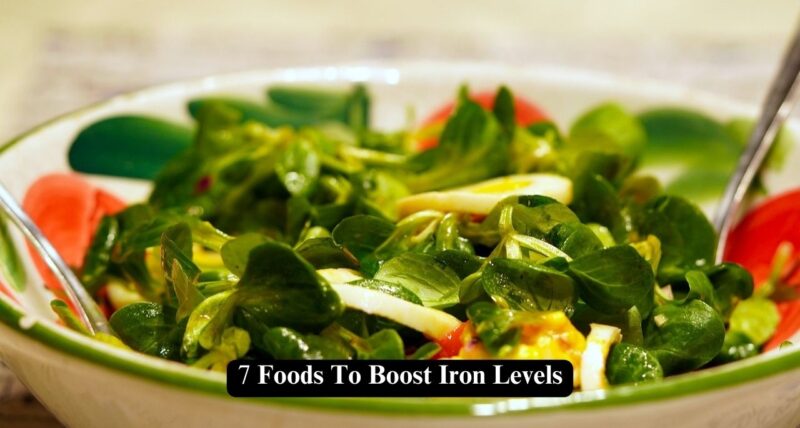Iron, an important mineral, performs a key function in transporting oxygen at some point in your body. It’s essential for energy manufacturing, healthy cell characteristics, and maintaining strong muscular tissues. In any case, iron deficiency is a standard subject, specifically among women, vegans, and vegetarians. Feeling constantly drained, weak, or winded? These could be side effects of low iron levels. But worry not! Nature provides a treasure trove of tasty meals to combat iron deficiency. Let’s discover seven foods to boost iron levels :
1. Red Meat: A Classic Iron Source
Red meat includes red meat, lamb, and liver. It’s one of the foods to boost iron levels and the supply of heme iron. Heme iron, with no trouble absorbed via the body, makes red meat a top desire for replenishing iron stores. A 3-ounce serving of cooked lean pork affords almost 3 milligrams (mg) of iron, satisfying a great portion of your daily needs.
Pro Tip: Opt for lean cuts like flank steak or sirloin and pair them with iron-absorption-improving meals like vitamin C-rich vegetables or fruits.
2. Shellfish: A Delicious Iron And Zinc Combo
Oysters, clams, mussels, and scallops are something beyond culinary pleasures. They are foods to boost iron levels. They’re filled with iron and zinc, each vital mineral for a healthy immune system. A 3-ounce serving of cooked oysters brags a great 8 mg of iron, surpassing your daily supported consumption!
Pro Tip: Appreciate shellfish steamed, grilled, or baked for a healthy and tasty meal.
3. Beans And Lentils: Iron-Rich Plant-Based Powerhouses
For veggie lovers and vegans, beans and lentils are champions in the iron division. A 1-cup serving of cooked lentils provides approximately 6.8 mg of iron, while a cup of cooked black beans provides around 3.9 mg.
Pro Tip: Upgrade iron ingestion from these plant-based resources. Match them with vitamin C-rich diet components like tomatoes, bell peppers, or a squeeze of lemon juice.
4. Dark Leafy Greens: Don’t Underestimate Their Power
Popeye knew what he was doing! Green leafy vegetables like spinach, kale, and collard veggies are rich foods to boost iron levels. Greens rich in vitamin C, despite being less accurately ingested than heme iron, can significantly improve iron retention.
Pro Tip: Integrate green leafy veggies into your weight loss plan. Include them for servings of mixed green salads, smoothies, and pan-fries, or perhaps slip them into your morning omelet.
5. Fortified Foods: A Convenient Iron Boost
The meal industry has spoken back to iron deficiency concerns. They fortified diverse breakfast cereals, grains, and even a few plant-based milks with iron. These fortified alternatives provide a convenient way to grow your day-by-day iron consumption.
Pro Tip: Check the nutrition label to find out how much iron a serving provides. Then, choose products with the very best iron content.
6. Dried Fruits: A Sweet And Nutritious Iron Source
Raisins, prunes, apricots, and dates are delectable and versatile snacks that sneak up iron punch. A portion of a cup serving of dried apricots, for example, offers around 2 mg of iron.
Pro Tip: Opt for unsulfurized dried culmination for a healthier alternative. Enjoy them as a mid-day snack or add them to your path mix for a pre-exercising increase.
7. Pumpkin Seeds: Tiny Seeds, Big Iron Content
Try not to underestimate the power of pumpkin seeds, another one of the foods to boost iron levels! These tiny nutritional forces to be reckoned with are a staggering source of iron, with a quarter-cup introducing around 4.2 mg. They’re additionally rich in zinc, healthy fat, and protein.
Pro Tip: Snack on cooked pumpkin seeds. You can likewise sprinkle them over plates of mixed greens, soups, or yogurt for a presented dietary improvement.
Remember: Those meals are splendid sources of iron. However, it is critical to seek advice from your medical doctor if you suspect iron deficiency. They can perform a blood test to confirm your iron levels and endorse the most appropriate path of movement.
Additionally: Certain elements can preclude iron absorption. Avoid consuming tea, coffee, or calcium-rich meals like dairy products straight away, earlier than or after iron-rich food. These can interfere with iron absorption.



